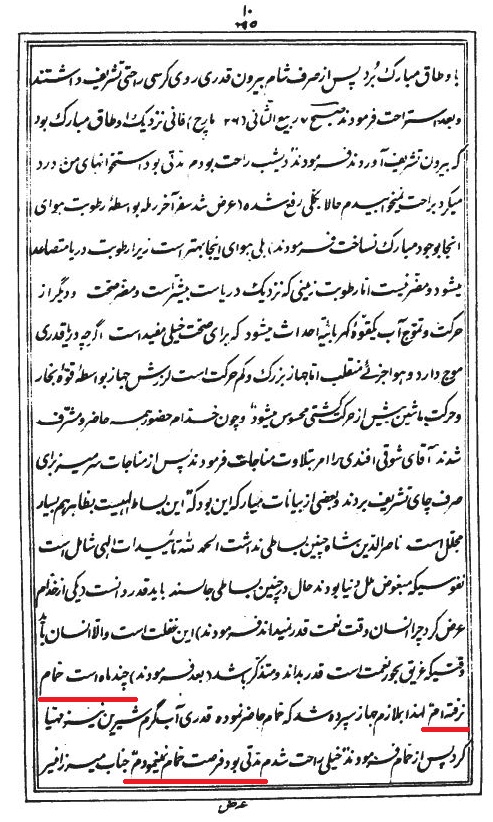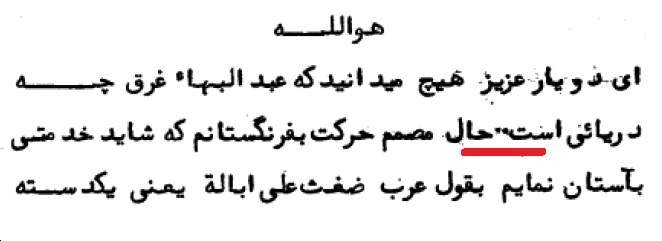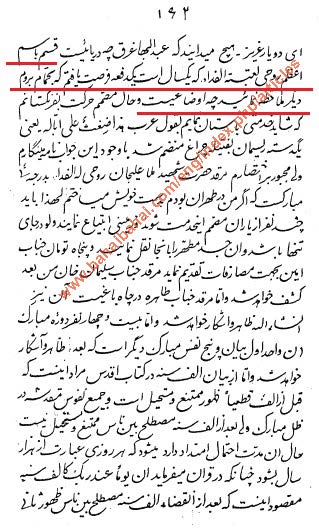You are here: Home>Articles> Abdu’l-Baha Wouldn’t Bathe for Months at a Time and How Baha’is Suppressed this Fact
Baha'u'llah has enjoined upon his followers to bathe once a week:
“It hath been enjoined upon you to pare your nails, to bathe yourselves each week in water that covereth your bodies, and to clean yourselves with whatsoever ye have formerly employed. Take heed lest through negligence ye fail to observe that which hath been prescribed unto you by Him Who is the Incomparable, the Gracious.”
According to Baha’i scripture, Abdu’l-Baha wouldn’t bathe for months at a time. This act going against his father’s orders, has been censored and supressed in published works of Baha’is or simply distorted in the translation of Baha’i works into English. We will present here two such documents.
The first document is a distorted translation in the book Mahmud’s Diary:
“One of the servants asked why man is not thankful when in comfort. `Abdu'l-Bahá replied, `It is due to negligence. Otherwise one must be aware and thankful when immersed in the sea of bounties.' Then He said, `I have not had a good bath for several months.' The ship's attendant was then asked to prepare a warm fresh water bath for Him. Afterwards, He said, `I am much better now. For a long time I have not had leisure to take a real bath.'” (Mahmud Zaraqani, translated by Mohi Sobhani, Mahmúd's Diary: The Diary of Mírzá Mahmúd-i-Zarqání Chronicling `Abdu'l-Bahá's Journey to America, p. 15, http://bahai-library.com/books/mahmud/)
Pay attention to the two words “good” and “real”. These adjectives do not exist in the original Persian text of Mahmud’s diary. Abdu’l-Baha clearly states that he has not had a bath for several months and that he has not had leisure to take a bath for a long time. Two seemingly innocent words (‘good’ and ‘real’) have been added to this statement to hide the fact that Abdu’l-Baha had not taken a bath for a long time. This is the original Persian text for comparison:

«چند ماه است حمام نرفته ام. لهذا بملازم جهاز سپرده شد که حمام حاضر نموده قدری آب گرم شیرین نیز مهیا کرد. پس از حمام فرمودند خیلی راحت شدم. مدتی بود فرصت حمام نمی نمودم.» (محمود زرقانی، بدایع الآثار، ج1، ص 10)
The second suppressed document is in Persian and has not been translated to English but is available on the official Baha’i library here: http://reference.bahai.org/fa/t/ab/MAS2/mas2-84.html#pg83 The prominent Baha’i scholar, Ishraq Khavari, mentions the following statement from Abdu’l-Baha at the bottom of the page:

«ای دو یار عزیز هیچ می دانید که عبدالبهاء غرق چه دریایی است .. حال مصمم حرکت به فرنگستانم که شاید خدمتی بآستان نمایم.» (اشراق خاوری، مائده آسمانی، ج2، ص 83)
“Oh two dear friends, do you know in what sea Abdu’l-Baha is sinking .. now I am determined on journeying to the West so that I may perform service to [Baha’u’llah’s] court.” (Ishraq Khawari, Maidiyih Asimani, vol 2, p. 83)
As you can see in the image, a section from this tablet has been replaced with “..” After some serious digging, we finally found the original tablet in its uncensored form on page 162 of the 17th volume of the Iranian National Baha’i Archives ( http://www.h-net.org/~bahai/index/diglib/INBA.htm ). An image from this tablet is provided below with the censored section marked in red:

This is what the original version reads:
«ای دو یار عزیز هیچ می دانید که عبدالبهاء غرق چه دریایی است قسم به اسم اعظم روحی لعتبه الفداء که یکسال است یکدفعه فرصت یافتم که به حمام بروم دیگر ملاحظه نمایید که چه اوضاعیست حال مصمم حرکت به فرنگستانم که شاید خدمتی بآستان نمایم.»
“Oh two dear friends, do you know in what sea Abdu’l-Baha is sinking. I swear by the greatest name, may my soul be sacrificed for his shrine, that it is [now] one year that I have only had time to bathe once. See what a situation we have. Now I am determined on journeying to the West so that I may perform service to [Baha’u’llah’s] court.” (Abdu’l-Baha, Iranian National Baha’i Archives [INBA], vol. 17, p. 162)
Abdu’l-Baha confesses that he hadn’t bathed for one year! It is totally understandable why the UHJ would want to censor this statement.
Baha’i faith, Baha’i cult, Baha’ism, Bahai, Baha’u’llah, Kitab-i-Aqdas, Curse, Subh-i-Azal, Mirza Yahya Subh-I Azal, Hypocrisy, Twelve Baha'i Principles, 12 Baha'i principles, Baha'i teachings, Baha'i Principles, Baha'i beliefs, Baha’i, Baha’u’llah, Abdu’l-Baha, the Bab, Shoghi, Independent Investigation of the Truth, Oneness of the World of Humanity,Religion Must Be the Source of Unity, Religion must be in accord with Science and Reason, Removal of all Prejudice, Spiritual Solution of the Economic Problem, Establishment of the Universal House of Justice, Universal Compulsory Education, Universal Language, Equality of Men and Women, Universal Peace, Humanity Is in Need of the Blessings of the Holy Spirit, Mirza Husayn Ali Nuri, Mirza Hossein Ali Noori, Baha’u’llah, Bahaullah, `Abdu'l-Baha, Abd al-Baha, Shoghi Effendi, Baha’ism, Bahaism, Baha'i, Bahai, Babism, The Bab, The Guardian, Universal House of Justice, UHJ, Comprehensive analysis of the twelve Baha'i principles, Shaykhi, Bayani, Bayan, Azali, Mason Remey, Orthodox Baha'i, Ali Muhammad Bab, Sayyid Kazim Rashti, Ruhi, Edward Browne, Manifestation of God, God Passes By, A Traveler's Narrative, Abdu'l-Baha in London, Bahai World Faith, Foundations of World Unity, Memorial of the Faithful, Paris Talks, Selection from the writings of Abdu'l-Baha, Some answered Questions, Tablet to August Forel, Tablets of Abdu'l-Baha, Tablets of the Divine Plan, The Promulgation of Universal Peace, The Secret of Divine Civilization, The Will and Testament of Abdu'l-baha, Epistle to the Son of the Wolf, Gems of Divine Mysteries, Gleanings from the Writing of Bahaullah, Prayers and Meditations by Bahaullah, Proclamation of Bahaullah, Tablets of Bahaullah Revealed after the kitab Aqdas, The Hidden Words of Bahaullah, The kitab i Iqan, The book of Iqan, Iqan, The Seven Valleys and the Four Valleys, The Summons of the Lord of Hosts, The Tabernacle of Unity, Bahai Prayers A Selection of Prayers Revealed by Bahaullah the Bab and Abdu'l-Baha, Compilation on Bahai Education, Compilation on Peace, Compilation on Women, Compilation on Scholarship, Japan Will Turn Ablaze, Bahaiyyih khanom, Baha'u'llah and New Era, The Dawn Breakers, Arohanui Letters from shoghi Effendi to New Zealand, Bahai Administration, Citadel of Faith, Dawn of a New Day, Directives From the Guardian, God Passes By, High Endeavours Messages to Alaska, Letters from the Guardian to Australia and New Zealand, Message to Canada, Message to the Bahai World 1950-1957, Messages to America, The Advent of Divine Justice, The Light of Divine Guidance, The Promised Day is Come, The World Order of Bahaullah, Unfolding Destiny, Persian Bayan, Arabic Bayan, Selections from the Writing of the Bab, Century of Light, One Common Faith, Statement on Baha'u'llah, The Promise of World Peace, The Prosperity of Humankind, Baha’i cult, Baha’i faith

 Haters of light, sufferers from spiritual leprosy,unreasonable, unknowledgeable, polytheists, dry wood worthy of fire, possessors of wicked poisonous breath, deniers of God and his signs, hypocrites, ungodly, evil, unhuman, animals, earthworms, livestock, lowly flies, donkeys, dogs, beasts, those who should die with anger, earthly pebbles, people that must be tormented, people who will be cleansed from earth, bastards, children of Satan, manifestations of hell, manifestations
Haters of light, sufferers from spiritual leprosy,unreasonable, unknowledgeable, polytheists, dry wood worthy of fire, possessors of wicked poisonous breath, deniers of God and his signs, hypocrites, ungodly, evil, unhuman, animals, earthworms, livestock, lowly flies, donkeys, dogs, beasts, those who should die with anger, earthly pebbles, people that must be tormented, people who will be cleansed from earth, bastards, children of Satan, manifestations of hell, manifestations

Comments (admin@bahaibahai.com)
Furthermore, as is obvious in the text, Abdu'l-Baha did not enter a Turkish Bath after uttering these statements. He simply washed himself on the ship and then after washing himself immediately stated: "For a long time I have not had leisure to take a 'real' bath" to make it perfectly clear that he was referring to washing himself and not speaking about going to a Turkish Bath-house.
Finally, if his statements simply meant he hadn't visited a Turkish Bath for one year, there was no need to completely censor this sentence: " it is [now] one year that I have only had time to bathe once"